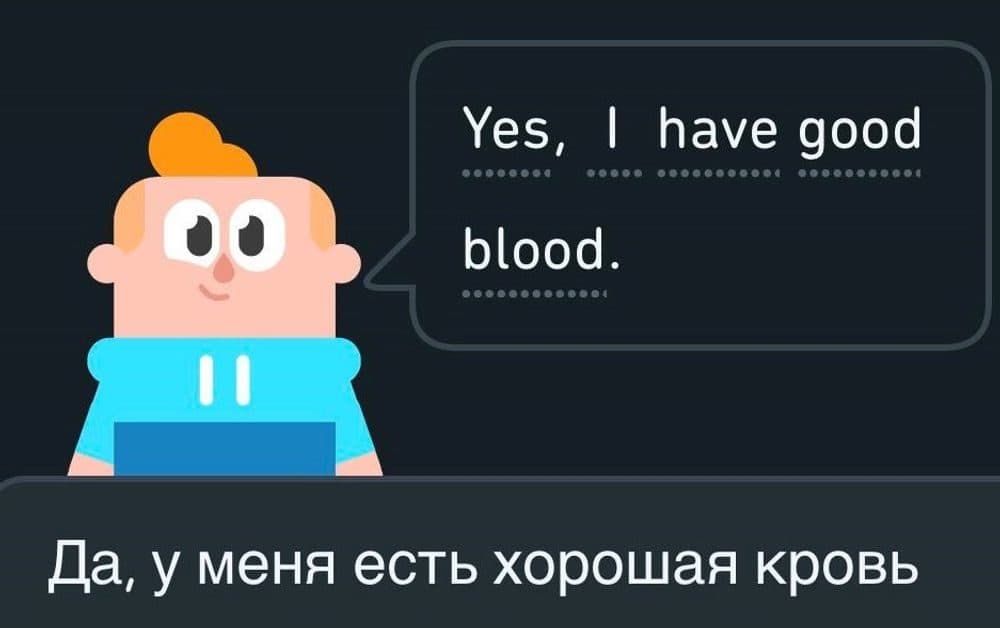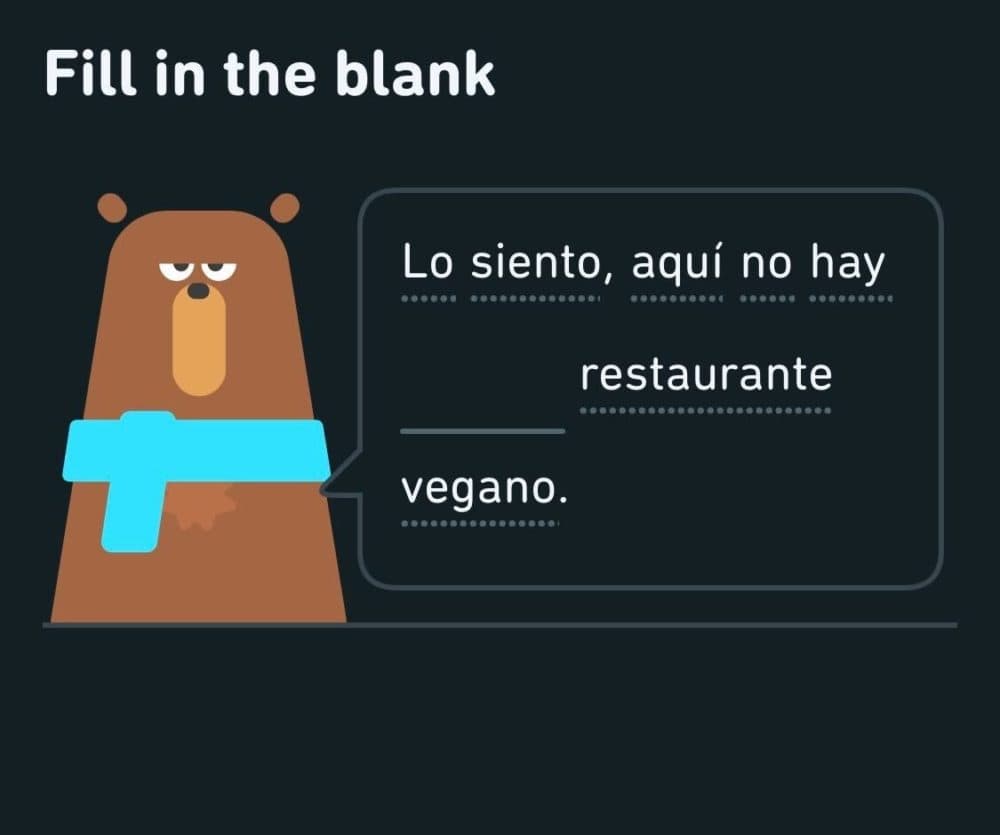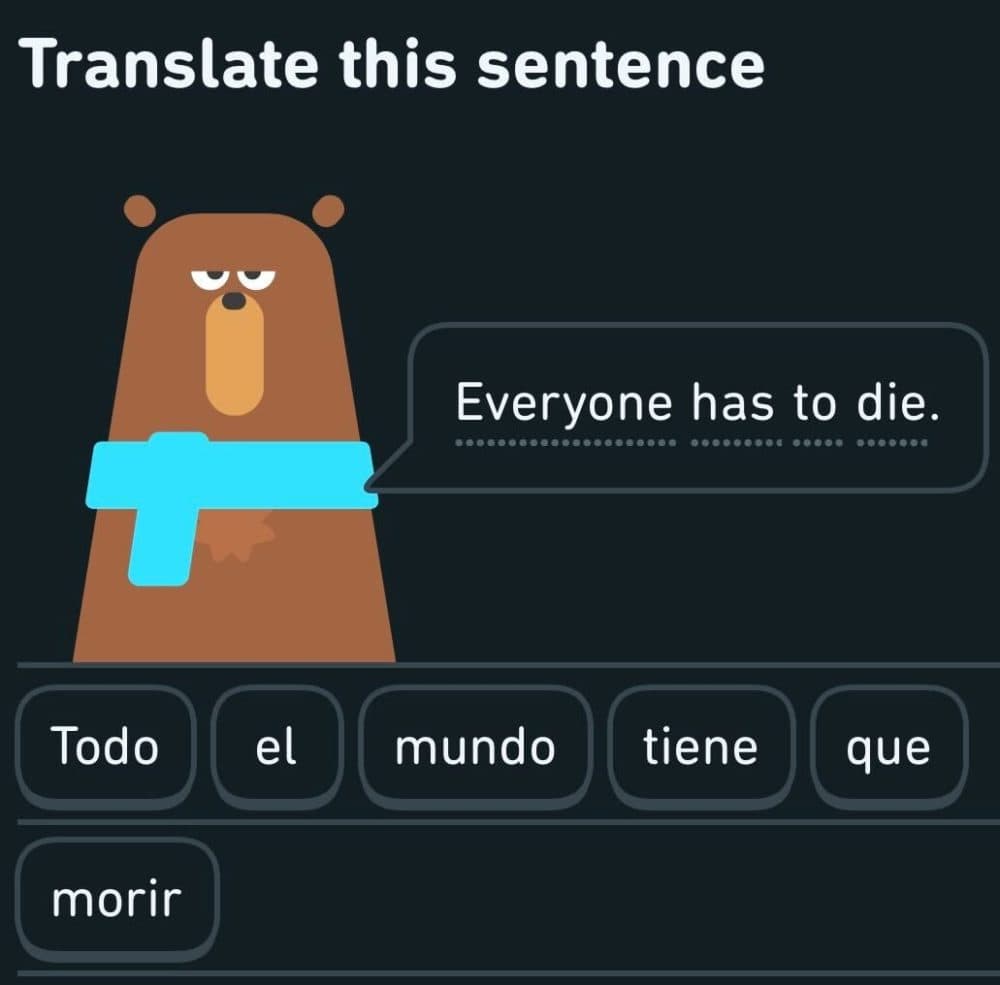Advertisement
Lost in Translation: two tales of getting it wrong
Resume
This week, we bring you two stories about the pitfalls of jumping to conclusions. First, our producer Grace Tatter recounts the curious case of the word "blood" popping up a little too frequently in Russian Duolingo lessons. Does this have something to do with Russia's invasion of Ukraine, or is it merely a coincidence? Next, Amory discusses a Reddit post in which a father immerses his adopted son in his native culture...only to realize he's made a huge mistake. Shout-out to our WBUR colleague Meagan McGinnes, who brought this Reddit post to our attention.
Show notes
- "Duolingo come answer for your crimes" (TikTok)
- "Duolingo reveals its top phrase of 2020" (Lonely Planet)
- "Well meaning OP and wife try to raise their adopted son in his native culture, only to find out when he turned 18 they've made a horrible mistake" (Reddit)
- Nicole Chung - All You Can Ever Know & The Challenges of Transracial Adoption (The Daily Show)
Support the show:
We love making Endless Thread, and we want to be able to keep making it far into the future. If you want that too, we would deeply appreciate your contribution to our work in any amount. Everyone who makes a monthly donation will get access to exclusive bonus content. Click here for the donation page. Thank you!
Full Transcript:
This content was originally created for audio. The transcript has been edited from our original script for clarity. Heads up that some elements (i.e. music, sound effects, tone) are harder to translate to text.
Grace Tatter: Hey, Amory.
Amory Sivertson: Ben, man, I know you have COVID, but it's done wonders for your voice. (Laughs.)
Grace: (Laughs.)
Amory: Hi, Grace.
Grace: Hi!
Amory: Grace Tatter, producer extraordinaire. How you doing?
Grace: I'm good. How are you? Back from a long journey.
Amory: Back from a bit of an adventure. It was supposed to be like a good, solid ten-ish days in Norway. And it turned into 20 plus days in Norway because of a COVID international travel mishap. My husband got COVID right before we were supposed to leave, and then the U.S. rightfully would not let us back in until he was negative. But I'm back here now, and now Ben has COVID. I think we're allowed to say that.
Grace: It's like it's a pandemic or something. It's like, it's like a contagious virus.
Amory: Oh, man. Yeah. But in the meantime, you and I get to share some stories with each other.
Grace: Yeah.
Amory: Would you like to go first?
Grace: Happily, yeah. And I actually, this even involves at some point a Norwegian phrase, so.
Amory: Get out.
Grace: It’s true.
Amory: I'm all ears.
Grace: So, yeah. So I recently was scrolling through TikTok as one does, and I got to one that posed a question. It's from an account called pumpkinheadgirl, and her real name is Maddie. And yeah, I'm going to I'm going to play a little bit of it for you.
[Maddie: I've held my silence long enough. I desperately need to know what the f*** is wrong with the person who writes the Russian Duolingo questions.]
Grace: Okay, so you are Duolingo. Right. I feel like I have. I have heard this before.
Amory: Sí, pero por Español. Or maybe it's para Español. The difference between por and para will will haunt me forever.
Grace: So I have also been dabbling with Duolingo. I don't think I'm as dedicated as you, so I don't know the difference between para and por either. But my curiosity was piqued because I do use the Duolingo app. And so –
Amory: What are you learning? Are you learning Spanish as well?
Grace: I'm also learning Spanish, total beginner. And I'm like refreshing myself with French. So I kind of like go between the two.
Amory: Oh, wow. Okay, that's, that's advanced.
Grace: Yeah. So I was curious about what the heck is going on with the person who writes the Russian Duolingo question. So I kept watching the video.
[Maddie: When I first started, I got “my blood”, and I thought that's weird that they're teaching me how to say “my blood” before they're teaching me how to say numbers, but maybe it's so I can say my blood type so that, you know, if I'm ever bleeding out in an emergency, I can say what my blood type is to the hospital right? No.]
Grace: So I, like I said, I've been doing this for two languages and I have never gotten the word for “my blood” in French or Spanish. Definitely done a lot of numbers. I don't know. Have you? Maybe. Is it just, is it just my phrases? Have you gotten anything that exciting?
Amory: I am convinced that, like, Duolingo listens to me and knows my life because it will — I'll get fed sentences like, “I'm sorry, we don't have anything vegan in this restaurant.”

Grace: Oh!
Amory: Or I just had a sentence yesterday about mi colega Ben, and I was like, “How do they know? How do they know that my colleague is Ben!” And I got ones about traveling while I was traveling. I don't know, man. I'm usually not conspiratorial like that, but I just think Duolingo knows me personally.
Grace: Okay, yeah. Well, okay. We'll see? Something is going on with Duolingo. Like this app is smarter than we think. So the next phrase that she learns or that she shows on this Tik Tok it's a little bit more dramatic. It says, “I want to live.” So, I don't know if Duolingo is listening to Maddie–I don't know what she's doing. (Laughs.) Yeah. I mean, as we've pointed out, we are in a pandemic, so I guess it is a useful phrase. But anyway, so Maddie gets this phrase, “I want to live” in Russian. And she says...
[Maddie: That's a weird thing to teach somebody, just learning. Um, I guess I can beg for my life now in Russian. Okay.]
Grace: And like also, I guess maybe this would hit a little bit differently if the language wasn't Russian and there wasn't a pretty terrible war going on right now with Russia. So, it's like funny, but it also feels a little like, sad and scary.
Amory: Yeah, I have gotten the sentence before, “Everybody has to die,” or “Everybody is going to die,” in Spanish. I know you have.
Grace: Wow, that’s really deep. And does it have like one of those, like, funny cartoon characters, though.
Amory: Of course, the big bear, that's like making kind of a grumpy face. I've taken a ton of screenshots of strange Duolingo sentences. So now immediately after this, I'm going to scroll through those and send you some. Maybe we can post some on our, on our web page.

Grace: Totally, yeah. And then we take a turn into the nonsensical kind of the next phrase is, “She has good blood.” So here's Maddie again.
Amory: Oh, God. (Laughs.)
[Maddie: Am I begging for my life from a Russian vampire and is my, is my strategy not to just fight the vampire, but to instead direct them to go kill somebody else. What?]
Grace: Then she shows another one. The next phrase is, “Why is there blood here?” And there's like a little cartoon character going, like, I don't really know how to describe it. Like, when you make guns with your fingers, but it's not violent. It's like.
Amory: Yeah, it's like pew pew pew. Yeah.
Grace: Exactly. Like a happy thing.
Amory: Yeah.
Grace: So it's like, why is there blood here? But it's fun. That's, that's the tone that the cartoon character is conveying. So here's Maddie again.
[Maddie: I don't know, Duolingo, why is there blood here? What does she know that I don't know? Why is there blood here?]
Grace: Duolingo raising all the questions, not giving us a lot of answers. And then there's one more.
[Maddie: And today there is blood on it. Why is there blood on the ticket? Duolingo, what did you do? I still don't know numbers, but I don't.]
Grace: And then the video abruptly cuts off. So, blood on the ticket. I mean, it does seem like they're telling us a little story here. Right? That does maybe seem like, violent and disturbing?
Amory: Do we have any answers? Has she tried reaching out to Duolingo or has Duolingo responded to her TikTok video?
Grace: They did respond to her TikTok video. And the official Duolingo’s account comment is pinned there. And it's, it's kind of coy. It's from their official account. So I'm picturing like their mascot Duo, the green bird, typing this and it says, “I don't get it. These are all useful phrases.”
So like, kind of like nonchalant, like nothing, nothing weird to see here. But I did some really hard hitting investigative journalism and I emailed Duolingo’s media team and they got back to me right away. I sent them the TikTok video.
Amory: Okay.
Grace: And I was like, first I was like, “Is this real?” Because, you know, people are smart. They can make Duolingo — they could probably make it look like Duolingo was saying something that it wasn't, but they said, yes. The TikTok video contains real examples from a Duolingo Russian for English lesson
Amory: Okay.
Grace: Although they did say the way that they are presented in the video is out of context of how they would be encountered in a Duolingo lesson, which makes it seem a bit more dramatically foreboding. So it wasn't like in the same lesson she was getting like, “What's your blood? I want to live. Why is there blood on the ticket?” I mean, like, in the same lesson, it would sound like a story about I don't know. I don't know what the story would be, but it wouldn't be a fun story.
Amory: Hmm.
Grace: They actually also gave me a reason for why the word blood comes so much in the Russian lessons. It's one of a relatively small number of words that end in a consonant, but take feminine agreement. So blood is being used to teach a particular grammatical agreement pattern. So that's actually a very boring way. They're not trying to freak Maddie out.
Amory: Hmmmm. Okay. But I still want to know if they're like, if they know my life to some extent
Grace: (Laughs.)
Amory: Or the extent to which more, more practically speaking, like, does Duolingo try to create any sort of a custom experience based on your cookies? Because I probably do search for vegan restaurants a lot, you know? Or is it just like, no, man, you guys are all learning the same stuff.
Grace: Yeah, and they didn't answer that. I will say that they did send me an article about how they try to use phrases and sentences that are memorable, which I don't know, maybe that maybe if what makes them memorable is that they're mirroring our lives. But a lot of times those are silly sentences. And so this is where the Norwegian sentence comes in. Did you do Duolingo for Norway — for Norwegian or just sticking to Spanish?
Amory: You know, I didn't. And I was feeling really badly about it, but I felt like I kind of need to stay in the Spanish zone. My sister did a little bit, but then she didn't — I didn't witness her using any of that Norwegian (laughs) in real life. So no, I don't. Tell me tell me the phrase.
Grace: This was a phrase that was used in 2020 and it was actually ended up being voted by Duolingo users as The Most 2020 Phrase of the Year. But I feel like you actually could have used it given your experience, given your experience. The phrase was, I am eating bread and crying on the floor.
Amory: Do you know how to say it?
Grace: It was “Jeg spiser brød og gråter på gulvet.”
Amory: Okay, I'm definitely going to ask my cousin to say for now. No offense to your pronunciation, but maybe well, maybe we'll leave it to the Norwegians. I am eating bread and crying on the floor.
[Harald (Amory’s Norwegian cousin): Jeg spiser brød og gråter på gulvet.]
Well, Grace, thank you so much. This was fascinating and thought provoking, and I feel like I have more questions than answers at this point. But in the best of ways.
Grace: Yeah. We're always happy to share my my tidbits from my TikTok scrolling.
Amory: See, never time wasted on TikTok. Well, after the break, Grace, I have a story for you.
[SPONSOR BREAK]
Amory: Okay. Grace, I have a story that originally came to me through our colleague Megan McGinnes, who writes the WBUR newsletter. This goes back eight years now. I think is when the original post was made, and it was made to the TIFU subreddit. Are you familiar with this one, Grace?
Grace: I am not. TIFU. I can't even – what does that stand for?
Amory: It stands for Today I F’d Up.
Grace: Uh. And you know what? You have to give it.
Amory: Well, I do all the time. And this is a well-loved subreddit among the endless thread and the Reddit crowd in general. I'm going to abridge the post for the sake of time, but — and I won't read the subject line because that's going to give it away. So I'm just going to jump in here. Okay. Come along for the ride.
This person posts: “About 17 years ago, my wife and I adopted a baby from an Asian-American family. I made very little inquiries as they seemed embarrassed, I didn't want to pry. I was just excited to have a son and couldn't have cared less about the parents history besides their current and future well-being.
Anyway, around about eight months we start to feel a little bit of guilt about not raising him in his own ethnic culture. And given that we live in an area with a major Chinese population, it would be very easy to introduce him to his roots. So for the next 17 years, we do everything we can to honor his ethnicity. We sent him to Chinese language courses and by five he's fluent in Mandarin and English. He gets, quote, adopted by a Chinese aunt and uncle. They taught him cultural things and celebrate certain holidays and take him for dim sum every couple of weeks. We've been taking him to China every two years since he was eight. We weren't trying to force him to take up his culture, as in, quote, other in our family. But we didn't want to rob him of it or completely whitewash him either. We try and be PC as possible and we thought we were doing the right thing. He's the best thing that's ever happened to me and my wife. There's not a day where I don't just look at him and smile warmly. I love him.”
Okay. Grace, anything jump out to you yet at this point?
Grace: It's interesting. I've actually been talking a lot to friends about transracial adoption because I'm a lot of my friends are thinking about having families and kids. So I'm very interested to see where this is going, because I think that there are a lot of complicated questions about transracial adoption.
Amory: Yeah. So this person writes, “Anyway, we're filling out his college app, slash financial aid applications and doing that whole thing. I go to my home office and go through some files and find his old adoption records. I'm not really paying much attention to them. And then his biological parents' surnames pop out and basically punch me in the face. His parents’ last names were Park and Kim.
Amory: For those of you who do not know, those are Korean last names. My son is not Chinese. Not even a little bit. He's Korean. I've dedicated nearly two decades to helping my son be close to his roots that aren't even his. I feel like a complete a****** to the nth degree. I have yet to disclose this to my son or wife. I honestly don't even know if I will.”
So this is quite a predicament.
Grace: Oh, my gosh. And yeah, I had my hands on my face the entire time, like, ooh! Because I mean, I'm just thinking about that kid. Like, I feel like it is really important to, you know, kind of have a sense of your roots. And even if people weren't purposefully lying… yeah, his past and like a really possibly important part of his identity has been obscured from him or like he's been, ugh! It's just. It's bad.
Amory: Yeah. And it didn't. There are there were certain things that didn't occur to me until reading it a second time, like, oh yeah, he didn't say a Chinese American family in the beginning. He said an Asian-American family. And so where — how did the leap happen? Which he explains, number one, but also number two, like, I have not had to do this. I'm not going to cast stones here. But it seems really well intentioned and also kind of impossible to impart a culture to a child that one is not your own and two is not just one culture. Right? It's like it's China. It's… Like, even if the, if the child becomes fluent in Mandarin, what if his parents spoke Cantonese? Oh, wait, they don't even speak Cantonese, they are Korean, you know? So I feel for this person because it seems like it was, it was going to be a hard task no matter what. But also like to go back to the adoption papers when you're filling out college applications and not in the 17 years in between.
Grace: Well, yeah! It reminds me I actually just finished this memoir called All You Can Ever Know by Nicole Chung. And she's an adoptee, a Korean-American adoptee, actually.
Amory: Okay.
Grace: And she talks a lot about her feelings about her adoptive parents not being very curious about her birth parents and kind of, you know, that did end up causing her some pain down the line. And it sounds like now, though, with adoptions that there's a lot more, that there are a lot more open adoptions so like, maybe a story like this would be less likely to happen in another 18 years.
Amory: Yeah. So there was an update that I think was posted pretty shortly after the original post. The guy wrote: “So last night I broke the news to my son after consulting with my wife. We sort of just told him straight up and explained our mistake. There were some tears and some laughter, and like many of you pointed out in the comments, there was still lots of love. He's confused, but as happy as he can be in this situation. My son isn't on Reddit, but within a few hours after my confession, a friend texted him, basically saying, ‘This sounds exactly like you and something your dad would do.’'' Oy. (Laughs.) “He read the post, which he thought was sort of funny, but we agree on a “no reading the comments” policy for our own well-being. I think out of everything, he was only really pissed that I posted it without telling him first, which in hindsight was awful on my part. Once again, I've proven I'm a complete a******.”
So as you mentioned, like you, what your first reaction was mine as well, Grace like, just thinking about this kid and this keeps resurfacing in the best of and Best of Redditor updates because the OP deleted the post and like we don't know who they are, we don't know who the son is, but it's been eight years, so the son is mid-twenties now. And I'm dying to know how this has affected his life, how this has shaped him, what he just what he makes of it all like, to say that he is as happy as he can be in this situation is like a tantalizingly vague and frustrating statement. And I'm sure it was written just kind of in the heat of all of this, but I'd love to now with eight years of distance, know how does this actually affect someone when you've been raised your whole life thinking one thing, finding out another, and the extent to which you just want to kind of like start over and figure out who you are without this extra unintentional baggage?
Grace: And it's a big lesson in like intent versus impact, only it sounds like a very loving family. But yeah, I really hope that the son has found the answers that he needs and continues to be able to have conversations about this.
Amory: Yeah. Well, Grace, we've learned some new phrases. We've learned about learning languages that maybe you thought were your native language and are not, learning languages that are not your native language, but you want to learn them. And we've learned that sometimes you just need to sit on the floor and eat bread and cry. Right? Something like that?
Grace: Exactly. It's universal. That is a sentiment that crosses all languages.
Amory: That's true.
[Harald: Jeg spiser brød og gråter på gulvet.]
Amory: Grace Tatter, thanks again for joining me this week.
Grace: Thank you.
Amory: This episode was produced by Grace Tatter and myself with help from Megan Cattel. Special shout out to my Norwegian cousin-in-law — is that a thing? That should be a thing. Harald in Heggedal. Tusen takk, Harald! Mix and sound design by Matt Reed. ¡Hasta luego!

